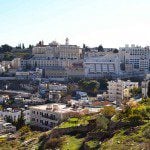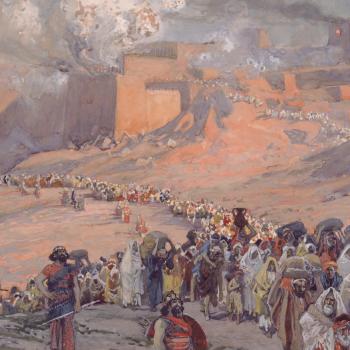
(Wikimedia Commons)
After the panel discussion in which we had both participated on Wednesday morning, Hilla Medalia gave me a pair of tickets to her new documentary, which is showing at the Sundance Film Festival. So my wife and I have just returned from seeing it.
The Oslo Diaries is quite informative, but also quite moving. My wife and I both loved the film, though we also found it profoundly sad. We were actually living in Jerusalem with our children through the heart of the period with which it’s chiefly concerned. I think that every student of the Middle East and everybody interested in Israel and Palestine ought to see it.
***
Another part of my manuscript designed to introduce Latter-day Saints to basic Islamic history and teaching:
I have already hinted in this chapter at some of the differences between the Qur’anic version of biblical stories and the earlier Hebrew accounts. It will be recalled that, according to the Qur’an, Abraham and Ishmael came down to west central Arabia and there founded the Meccan Ka’ba, asking that they might be given a posterity that “submits” to God (i.e., is “Muslim”).[1] This incident is totally unknown to the Old Testament, but it serves to give ancient Arabia— which had previously seemed an utter blank spot in the record of God’s dealings with humankind—a role in the divine scheme of world history, a role that extends back even beyond the coming of the Prophet Muhammad. (Some non-Latter-day Saint scholars have argued that the Book of Mormon served the same purpose for the Americas.) As I have noted, it is intriguing that the Qur’an rarely argues for this visit by Abraham and Ishmael, but simply refers to it as a story already well known to both believers and nonbelievers alike in early Arabia.
Far more important is the different view of Jesus taken by the Qur’an. It is not merely the stories about Jesus’ boyhood that are different. Tales about his speaking in the cradle and about his making a bird out of clay and then breathing life into it and watching it fly away are well known from the so-called “infancy gospels” that circulated in early Christianity.[2] No, the distinction between Islam and Christianity concerning the place of Jesus is much wider and much more significant than any issue raised by such stories.
First, Islam denies that Jesus died upon the cross. The Jews are quoted in the Qur’an as saying, “‘We slew the Messiah, Jesus Son of Mary, the Messenger of God’—yet they did not slay him, neither crucified him, only a likeness of that was shown to them… And they slew him not of a certainty—no indeed; God raised him up to Him.”[3] A similar position, claiming that Jesus did not actually suffer under Pontius Pilate but only seemed to do so, is associated in Christian history with a heresy known as “docetism.” (The name of the movement comes from the Greek verb dokeo, meaning “to seem.”) The Christian theological tendency that went under that title argued that Jesus, as God, was too exalted a being to suffer pain and that the real Christ, therefore, must have been removed from the scene before the actual suffering began. Other Christians rejected it as a heresy because there cannot be an atonement if there was no death. But where Christians would regard such an implication as fatal for the docetist view, Muslims would not be troubled at all. Indeed, the Qur’an denies the possibility of intercession by one soul for another.[4]
[1] 2:125 -29; 14:35 -37.
[2] 3:46; 5:110; 19:29-33; 3:49; 5:110.
[3] 4:157 58 (Arberry).
[4] 2:48; 17:15; 21:28; 35:18; 39:7, 44; 53:38-39.












